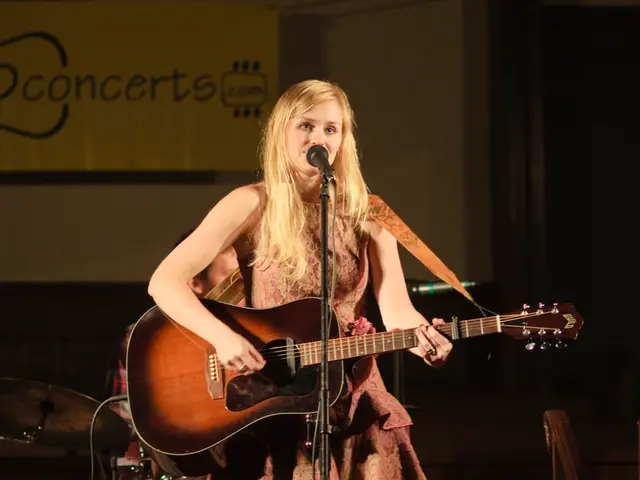Sun, Secrets, and Shadows: A Chat with Gerster and Riley on "Islands"
"Fuerteventura project proved an added advantage"
After the success of "Oh Boy" (2012) and "Lara" (2019), Jan-Ole Gerster delves into another intriguing tale with "Islands". In this psychological thriller, Sam Riley shines as a melancholic tennis instructor leading a seemingly glamorous life on Fuerteventura, only to be ensnared in the mysterious disappearance of a guest due to unusual circumstances. The film has earned three nominations for the German Film Awards.
During an interview with ntv.de, Gerster and Riley discuss their experience filming on Fuerteventura, the fate of the central character, and the impact of Dascha Dauenhauer's enchanting film score.
ntv.de: Sam, had you ever vacationed on the Canary Islands before the "Islands" shoot?
Sam Riley: My grandparents wanted to retire on Tenerife, and I visited them when I was twelve. It was the only time I had been on a Canary Island. I absolutely loved the shooting location there. I enjoy sunny weather, but I didn't grow up with it. As a child, I spent all my holidays in England, usually no farther than an hour and a half away on the coast in Yorkshire. We never took vacations far from home. I adore places where you can frolic in the sea. But after eight weeks under the sun, I felt how it was for the character to work in that hotel. The first three weeks we filmed in a hotel where tourists were vacationing – chaos! Eventually, I longed for a thick winter coat and a walk around the Schlachtensee wrapped in a scarf in the cold.
Jan-Ole, when did you come up with the idea for "Islands"?
Jan-Ole Gerster: I'm easily influenced by places. Sometimes I find a spot so great that I want to make something there. Fuerteventura was appealing for both its cinematic potential and its quirks. If you go to the right spots, it's purely magical. However, there's also an outdated tourist world that intrigued me. I conceived the idea relatively quickly – a tennis instructor I observed from my balcony seemed like an interesting character. I found him fascinating because he appeared trapped in a paradise he couldn't escape. Escapism is a major theme in this film, as vacation is always a means of escaping reality for a few days. One starts drinking too early in the day and does things they desire. He, too, is escaping something, drinking himself into oblivion and engaging in illicit affairs, but never truly breaking free.
Sam, what drew you to the role when the offer came your way?
Riley: The opportunity to work on Fuerteventura was a bonus, and it briefly crossed my mind that six weeks in the sun would be a unique experience for me. But what truly mattered were the script, the plot, and the character. I read the script in one sitting, ironically on the beach, not in the sun. I knew straightaway that I had to play this character – any actor my age would be envious! It's an extraordinary character with layers of complexity and contradictions. I can't help but covet roles like this.
This film plays like a noir crime, although it isn't one. The character of Tom is multi-faceted...
Gerster: Part of the audience's empathy for the character stems from Sam Riley's remarkable acting skills. When investors viewed the character as a one-dimensional cliché of a tennis coach, I insisted that he's a man who reconnects with his emotional life and learns something about himself – about what's missing in his life. I had a rather naïve idea of the character; I envisioned him as experiencing a romantic transformation and finding depth. Sam breathed life into this character in ways I never anticipated, subtly portraying the emotional turmoil beneath Tom's surface.
The film features English dialogue with a smattering of German and Spanish...
Gerster: I've always watched films in their original language, and English is no exception. I wanted to broaden my artistic scope and create something in English. It's challenging to compete with German cinema in today's market, so I endeavored to make a film that could travel globally. It felt like a neutral space where everyone – the British, German crew, and Spanish natives – could feel at home. We were all merely guests on this island, united in our transience.
How did the script come together, and in which language?
Gerster: I collaborated with Blaž Kutin and Lawrie Doran on the script, working in what I call "European English" – a term that indicates imperfect but passable fluency. Blaž lent his touch to the screenplay, being a bit more fluent than I. When the time came to approach English actors, we enlisted Lawrie's help, who refined the dialogue and brought essential dramatic insights. Although we never all sat together to write, the collaboration felt natural and proved a wonderful experience.
Music catapults the film to another level; how did that concept emerge?
Gerster: I listened to a lot of music while writing the script, and we also experimented with diverse tunes during the shoot. Music assisted me in generating a more visual story, focusing on scenes rather than dialogues. In the editing process, we initially used a variety of musical styles, from film noir of the 70s to Pedro Almodóvar. Then Dascha Dauenhauer came on board.
Do you usually have reservations when the composer contributes the music?
Yes, but Dascha eased those fears. Her music blew us away. We spent considerable time together, discussing ideas, and she effortlessly comprehended my not-so-musical jargon. I described how the music needed to sound like an unrelenting, high-pitched ring that obscured all other sounds, followed by an uncomfortable abyss consonant with the film's underlying tension. Days later, she delivered a piece that perfectly encapsulated those emotions. The music's unique fusion of familiar elements and a fresh perspective is truly mesmerizing.
Nicole Ankelmann is the editor responsible for entertainment. She enjoys conversing, alternative rock, indie folk, metal, and both challenging art-house films and well-crafted blockbusters. Sam, what was your reaction when you first saw the film with the completed score?
Riley: I watched the picture with the final score for the first time in the cinema and was amazed. Dascha demonstrated incredible artistic skill. Her music harmonized flawlessly with the film's mood. It's rare to encounter a score that resonates so strongly without feeling overly intrusive or repetitive.
Are you still making music yourself?
Riley: Yes, but not with the band anymore. I create music for my personal enjoyment and may potentially release something in the future. I play the guitar almost every day at home.
The European Union and the United States might be interested in the German Film Awards nominations received by "Islands", a movie filmed on the Canary Island of Fuerteventura. In the film, Sam Riley plays a tennis instructor who leads a seemingly glamorous life but is secretly ensnared in a mysterious disappearance. Riley, who had previously only visited a Canary Island when he was twelve, enjoyed filming in the sunny location but longed for colder weather after eight weeks. Gerster, the director, found Fuerteventura appealing for its cinematic potential and quirks, which served as inspiration for the movie's story. The film features a screenplay written in English, reflecting Gerster's desire to broaden his artistic scope and create a globally travelable movie. The unique fusion of music in "Islands", composed by Dascha Dauenhauer, adds an extra layer to the film. When Riley first saw the completed score, he was impressed by the harmony between the music and the film's mood. Despite not being a blockbuster, the film plays like a noir crime due to its multi-faceted character and emotional turmoil.








